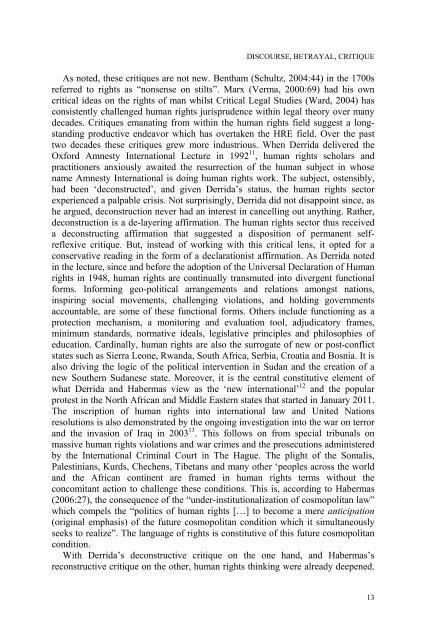Safe Spaces Human Rights Education in Diverse Contexts
Safe Spaces Human Rights Education in Diverse Contexts
Safe Spaces Human Rights Education in Diverse Contexts
Create successful ePaper yourself
Turn your PDF publications into a flip-book with our unique Google optimized e-Paper software.
DISCOURSE, BETRAYAL, CRITIQUE<br />
As noted, these critiques are not new. Bentham (Schultz, 2004:44) <strong>in</strong> the 1700s<br />
referred to rights as “nonsense on stilts”. Marx (Verma, 2000:69) had his own<br />
critical ideas on the rights of man whilst Critical Legal Studies (Ward, 2004) has<br />
consistently challenged human rights jurisprudence with<strong>in</strong> legal theory over many<br />
decades. Critiques emanat<strong>in</strong>g from with<strong>in</strong> the human rights field suggest a longstand<strong>in</strong>g<br />
productive endeavor which has overtaken the HRE field. Over the past<br />
two decades these critiques grew more <strong>in</strong>dustrious. When Derrida delivered the<br />
Oxford Amnesty International Lecture <strong>in</strong> 1992 11 , human rights scholars and<br />
practitioners anxiously awaited the resurrection of the human subject <strong>in</strong> whose<br />
name Amnesty International is do<strong>in</strong>g human rights work. The subject, ostensibly,<br />
had been ‘deconstructed’, and given Derrida’s status, the human rights sector<br />
experienced a palpable crisis. Not surpris<strong>in</strong>gly, Derrida did not disappo<strong>in</strong>t s<strong>in</strong>ce, as<br />
he argued, deconstruction never had an <strong>in</strong>terest <strong>in</strong> cancell<strong>in</strong>g out anyth<strong>in</strong>g. Rather,<br />
deconstruction is a de-layer<strong>in</strong>g affirmation. The human rights sector thus received<br />
a deconstruct<strong>in</strong>g affirmation that suggested a disposition of permanent selfreflexive<br />
critique. But, <strong>in</strong>stead of work<strong>in</strong>g with this critical lens, it opted for a<br />
conservative read<strong>in</strong>g <strong>in</strong> the form of a declarationist affirmation. As Derrida noted<br />
<strong>in</strong> the lecture, s<strong>in</strong>ce and before the adoption of the Universal Declaration of <strong>Human</strong><br />
rights <strong>in</strong> 1948, human rights are cont<strong>in</strong>ually transmuted <strong>in</strong>to divergent functional<br />
forms. Inform<strong>in</strong>g geo-political arrangements and relations amongst nations,<br />
<strong>in</strong>spir<strong>in</strong>g social movements, challeng<strong>in</strong>g violations, and hold<strong>in</strong>g governments<br />
accountable, are some of these functional forms. Others <strong>in</strong>clude function<strong>in</strong>g as a<br />
protection mechanism, a monitor<strong>in</strong>g and evaluation tool, adjudicatory frames,<br />
m<strong>in</strong>imum standards, normative ideals, legislative pr<strong>in</strong>ciples and philosophies of<br />
education. Card<strong>in</strong>ally, human rights are also the surrogate of new or post-conflict<br />
states such as Sierra Leone, Rwanda, South Africa, Serbia, Croatia and Bosnia. It is<br />
also driv<strong>in</strong>g the logic of the political <strong>in</strong>tervention <strong>in</strong> Sudan and the creation of a<br />
new Southern Sudanese state. Moreover, it is the central constitutive element of<br />
what Derrida and Habermas view as the ‘new <strong>in</strong>ternational’ 12 and the popular<br />
protest <strong>in</strong> the North African and Middle Eastern states that started <strong>in</strong> January 2011.<br />
The <strong>in</strong>scription of human rights <strong>in</strong>to <strong>in</strong>ternational law and United Nations<br />
resolutions is also demonstrated by the ongo<strong>in</strong>g <strong>in</strong>vestigation <strong>in</strong>to the war on terror<br />
and the <strong>in</strong>vasion of Iraq <strong>in</strong> 2003 13 . This follows on from special tribunals on<br />
massive human rights violations and war crimes and the prosecutions adm<strong>in</strong>istered<br />
by the International Crim<strong>in</strong>al Court <strong>in</strong> The Hague. The plight of the Somalis,<br />
Palest<strong>in</strong>ians, Kurds, Chechens, Tibetans and many other ‘peoples across the world<br />
and the African cont<strong>in</strong>ent are framed <strong>in</strong> human rights terms without the<br />
concomitant action to challenge these conditions. This is, accord<strong>in</strong>g to Habermas<br />
(2006:27), the consequence of the “under-<strong>in</strong>stitutionalization of cosmopolitan law”<br />
which compels the “politics of human rights […] to become a mere anticipation<br />
(orig<strong>in</strong>al emphasis) of the future cosmopolitan condition which it simultaneously<br />
seeks to realize”. The language of rights is constitutive of this future cosmopolitan<br />
condition.<br />
With Derrida’s deconstructive critique on the one hand, and Habermas’s<br />
reconstructive critique on the other, human rights th<strong>in</strong>k<strong>in</strong>g were already deepened.<br />
13














